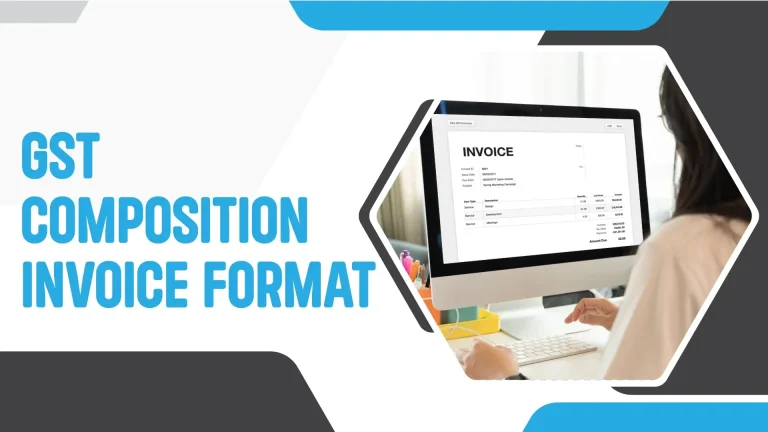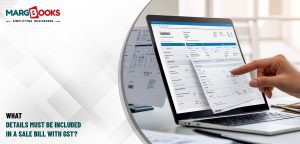The GST (Goods and Services Tax) Composition Scheme is a straightforward and user-friendly taxation scheme designed for small businesses in India. This scheme reduces the compliance burden for small taxpayers by allowing them to pay GST at a fixed rate of turnover and file quarterly returns instead of monthly ones. By opting for this scheme, small businesses can focus more on their operations and less on tax compliance. This blog will delve into the GST Composition Invoice Format, covering every aspect to provide a comprehensive understanding.
What is GST Composition Scheme?
The GST Composition Scheme is aimed at helping small businesses with an annual turnover of up to Rs. 1.5 crore. This scheme simplifies the tax-paying process by enabling businesses to pay a fixed percentage of their turnover as tax. The main advantage is the reduction in compliance and paperwork, making it easier for small businesses to manage their taxes. Additionally, businesses under this scheme benefit from fewer tax-related worries and can concentrate on growth and development. It’s a relief for many small business owners who find the regular GST compliance too cumbersome and time-consuming.
Who Can Opt for GST Composition Scheme?
Not all businesses are eligible for the Composition Scheme. Here are the key eligibility criteria:
- Turnover Limit: Businesses with an annual turnover of up to Rs. 1.5 crore. This ensures that only small and medium-sized enterprises benefit from the scheme.
- Business Type: Manufacturers, traders, and restaurant owners (excluding those serving alcohol) can opt for this scheme. This inclusion helps various small businesses across different sectors.
- Exclusions: Service providers (except restaurants) and businesses involved in interstate trade or supplying goods through e-commerce platforms are not eligible. These restrictions ensure that only those businesses which the scheme intends to help can participate.
Benefits of GST Composition Scheme
- Reduced Compliance: Quarterly returns and simplified record-keeping ease the administrative burden on small businesses. This reduction in paperwork allows business owners to focus more on running their operations efficiently.
- Lower Tax Rates: Fixed tax rates (1% for traders, 2% for manufacturers, and 5% for restaurants) make it easier to predict tax liabilities and manage finances. Lower tax rates also mean more savings and better cash flow management for small businesses.
- Ease of Operation: Simplified procedures reduce the administrative burden. Businesses can operate without the constant worry of complex tax compliance, making daily operations smoother and more efficient.
What is a GST Composition Invoice?
A GST Composition Invoice is a specific type of invoice issued by taxpayers registered under the GST Composition Scheme. Unlike regular GST invoices, these invoices have certain distinct features and requirements. It is essential for composition dealers to understand and adhere to these requirements to ensure compliance and avoid penalties. These invoices not only help in maintaining proper records but also provide transparency in transactions, which is crucial for both the business and its customers.
Key Features of GST Composition Invoice Format
- Invoice Heading: The invoice should clearly state “Bill of Supply” instead of “Tax Invoice” as composition dealers are not allowed to charge tax on the invoice. This distinction helps in identifying the invoice type easily.
- Supplier Details: Name, address, and GSTIN of the composition dealer should be prominently mentioned. Accurate supplier information is crucial for record-keeping and compliance.
- Invoice Number: A unique serial number for each financial year should be assigned to each invoice. This helps in tracking and auditing transactions efficiently.
- Date of Issue: The date when the invoice is issued must be clearly mentioned. This ensures that all transactions are recorded timely and accurately.
- Customer Details: Name, address, and GSTIN (if registered) of the buyer should be included. Proper customer information ensures transparency and aids in maintaining detailed records.
- Item Details: Description, quantity, unit, and total value of the goods/services supplied should be detailed. Clear item details help in understanding the transaction and verifying the goods/services provided.
- Total Value: Total value of goods/services should be calculated and mentioned. This ensures clarity on the amount involved in the transaction.
- Declaration: A mandatory declaration stating that “Composition taxable person. Not eligible to collect tax on supplies” should be included. This declaration is crucial to comply with GST laws and inform the customer about the nature of the invoice.
Example of GST Composition Invoice Format
Here is an example to illustrate the GST Composition Invoice Format:
Bill of Supply
GST Composition Invoice
| Supplier Name: | ABC Traders | Invoice Number: | 001/2023-24 |
|---|---|---|---|
| Supplier Address: | 123 Market Street, Mumbai, Maharashtra | Date of Issue: | 15th July 2024 |
| GSTIN: | 27XXXXXXXXX1Z5 | Customer Name: | XYZ Enterprises |
| Customer Address: | 456 Industrial Area, Pune, Maharashtra | GSTIN: | 27YYYYYYYYY1Z5 |
| Description | Quantity | Unit Price (Rs.) | Total (Rs.) |
|---|---|---|---|
| Product A | 10 pcs | 500 | 5000 |
| Product B | 20 pcs | 300 | 6000 |
| Total Value: | Rs. 11000 |
|---|
How to Prepare a GST Composition Invoice?
Creating a GST Composition Invoice involves several steps to ensure compliance with the GST laws:
- Prepare the Invoice Heading: Ensure the invoice is titled “Bill of Supply.” This is important as composition dealers cannot issue a tax invoice.
- Include Supplier Information: Mention your business name, address, and GSTIN. Accurate information helps in maintaining proper records and avoids any future discrepancies.
- Assign a Unique Invoice Number: Each invoice should have a unique serial number. This helps in tracking and managing invoices efficiently.
- Specify the Date: Clearly mention the date of issue. This helps in maintaining chronological order and accurate records.
- Include Customer Details: Add the customer’s name, address, and GSTIN (if registered). Proper customer details ensure transparency and aid in future references.
- Detail the Goods/Services: Provide a detailed description of the items, quantity, unit price, and total value. Clear details help in understanding the transaction and verifying the goods/services provided.
- Total Value: Calculate the total value of the goods/services supplied and mention it clearly. This ensures there is no confusion regarding the amount involved in the transaction.
- Add the Declaration: Include the mandatory declaration about the composition scheme. This declaration is crucial to inform the customer about the nature of the invoice and comply with GST laws.
Importance of Maintaining Accurate Invoices
Accurate invoicing is crucial for businesses under the GST Composition Scheme. It ensures compliance with GST laws and helps avoid penalties. Proper documentation also aids in smooth auditing and enhances transparency in business transactions. Maintaining accurate invoices not only helps in legal compliance but also builds trust with customers. It reflects the professionalism and reliability of the business, which can lead to better business relationships and growth opportunities.
Challenges Faced by Composition Dealers
- Limited Input Tax Credit: Composition dealers cannot claim input tax credit on their purchases. This can increase the cost of goods and services, making it challenging to compete with regular taxpayers who can claim input credit.
- Restricted Business Operations: They are not allowed to engage in interstate trade. This limitation can restrict the growth potential of businesses looking to expand their market beyond state borders.
- Higher Tax Rate for Certain Sectors: Service providers (except restaurants) cannot opt for this scheme, and those who can may face higher tax rates. This can reduce the attractiveness of the scheme for certain businesses.
Also Read
- What Details Must be Included in a Sale Bill with GST?Getting your GST paperwork wrong feels like walking through a minefield, doesn’t it? One missing detail on your invoices, and suddenly you’re dealing with compliance headaches that could’ve been easily avoided. Creating a proper Sale Bill with GST isn’t rocket… Read more: What Details Must be Included in a Sale Bill with GST?
- How Is a Purchase Bill with GST Different from a Sales Invoice?Running a business in today’s GST-enabled economy requires more than just selling and buying. It’s about being organised, compliant, and aware of what each document in your billing system stands for. One common confusion many businesses face is the difference… Read more: How Is a Purchase Bill with GST Different from a Sales Invoice?
- How Can You Generate a Mobile GST Bill in Seconds?Running a shop is hard enough. But when billing takes forever and GST compliance gets messy, things can slow down. That’s where a Mobile GST Bill comes to the rescue. Whether you run a busy garment store or a local… Read more: How Can You Generate a Mobile GST Bill in Seconds?
- What Happens If GST on Advance Received Is Not Paid on Time?Running a business in India requires keeping pace with ever-evolving tax laws, and GST in advance is one such area that many businesses often overlook sometimes unintentionally. But missing out on timely GST payment on advances can lead to unnecessary… Read more: What Happens If GST on Advance Received Is Not Paid on Time?
- How Does the 9988 HSN Code Impact GST Filing for Businesses?Navigating the complexities of GST can be daunting, especially for service-based businesses in India. Among the many elements of GST compliance, the HSN (Harmonised System of Nomenclature) code plays a crucial role in categorising goods and services. One such classification… Read more: How Does the 9988 HSN Code Impact GST Filing for Businesses?
Frequently Asked Questions
Can composition dealers charge GST on their invoices?
No, composition dealers cannot charge GST on their invoices. Instead, they must issue a “Bill of Supply” because they are not allowed to collect tax from customers. This invoice type indicates that the seller is under the GST Composition Scheme and the customer is not being charged GST separately. This is important for compliance with GST regulations and to ensure transparency in business transactions.
What is the tax rate under the GST Composition Scheme?
The tax rates for composition dealers are 1% for traders, 2% for manufacturers, and 5% for restaurant owners. These rates are lower than regular GST rates, making it easier for small businesses to manage their tax obligations. The fixed rate is calculated on the total turnover of the business, simplifying the tax computation process and reducing the administrative burden on small business owners.
Are composition dealers required to file GST returns?
Yes, composition dealers are required to file quarterly returns using Form GSTR-4 and an annual return using Form GSTR-9A. Filing these returns helps in maintaining compliance with GST regulations and ensures that the business is keeping proper records of its transactions. This reduced filing frequency compared to regular GST filers makes it easier for small businesses to handle their tax obligations without overwhelming administrative tasks.
Can composition dealers claim input tax credit?
No, composition dealers cannot claim input tax credit. This means they cannot deduct the GST paid on their purchases from their tax liability. As a result, the GST they pay on inputs becomes a part of their cost. This rule is designed to simplify the tax system for small businesses but can make their products slightly more expensive compared to regular GST payers who can claim such credits.
Is there a turnover limit for the GST Composition Scheme?
Yes, the GST Composition Scheme is available for businesses with an annual turnover of up to Rs. 1.5 crore. This limit ensures that only small and medium-sized businesses can benefit from the simplified tax structure. Businesses exceeding this turnover threshold must register under the regular GST scheme and comply with its more comprehensive requirements, including monthly return filings and input tax credit claims.
Can service providers opt for the GST Composition Scheme?
Generally, service providers cannot opt for the GST Composition Scheme, except for restaurant owners. However, a special composition scheme with a 6% tax rate is available for certain service providers with an annual turnover of up to Rs. 50 lakh. This helps small service providers manage their tax obligations more easily, though the restrictions and conditions for eligibility must be carefully considered before opting in.
What happens if a composition dealer exceeds the turnover limit?
If a composition dealer exceeds the turnover limit of Rs. 1.5 crore, they must switch to the regular GST scheme. This requires them to comply with all the regular GST regulations, including charging GST on sales, claiming input tax credit, and filing monthly returns. This transition is crucial to ensure compliance with GST laws and avoid penalties or legal issues related to incorrect tax filings.
How should composition dealers maintain their records?
Composition dealers should maintain detailed records of all purchases, sales, and stock. Proper invoicing and documentation are essential for compliance with GST regulations. These records help in filing accurate returns and are crucial during audits. Maintaining organized records ensures that the business can quickly provide the necessary documentation if required by tax authorities, thereby avoiding penalties and ensuring smooth operations.
Can composition dealers sell goods through e-commerce platforms?
No, composition dealers are not allowed to sell goods through e-commerce platforms. This restriction ensures that the simplicity of the Composition Scheme is maintained, as transactions through e-commerce platforms often involve more complex tax implications. Businesses wishing to sell online must opt for the regular GST scheme and comply with its more detailed requirements, including monthly tax filings and claiming input tax credits.
What are the penalties for non-compliance with the GST Composition Scheme?
Penalties for non-compliance with the GST Composition Scheme can include fines, interest on unpaid taxes, and the cancellation of GST registration. It is crucial for composition dealers to adhere to all the rules and regulations, such as issuing the correct type of invoice, maintaining proper records, and filing returns on time. Compliance ensures smooth business operations and helps avoid legal issues that could disrupt the business.






